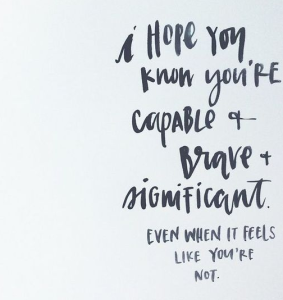 “Oh, here we go again, a reminder of how imperfect I am.” Usually when we think of self-improvement, we tend to start underestimating ourselves, our potential, and our purpose. We focus on our weaknesses and our mistakes, making it difficult to remember our strengths and successes.
“Oh, here we go again, a reminder of how imperfect I am.” Usually when we think of self-improvement, we tend to start underestimating ourselves, our potential, and our purpose. We focus on our weaknesses and our mistakes, making it difficult to remember our strengths and successes.
Have you ever received “constructive criticism” but, in reality, the words actually take jabs at your heart? Have you ever set goals and held high hopes, only to realize that carrying them out was close to impossible? (especially with the way you had planned)
Like many of us, you’ve probably felt down on yourself. You’ve probably failed a few times and have felt like you were drowning in depths of despair. The last thing you want to think about is how you can be better.
You’ve already made a list of what you consider weaknesses and what you can improve: serving others, friends, smiling, prioritizing, organizing, cleaning, showing your love, getting good grades, finding/keeping a job, stop crying so often, eat less/more, exercise, and so forth.
At this point you’re having trouble trying to remember that you’re worth something.
This isn’t how self-improvement should be. There is an optimistic side of self-improvement that  many people don’t mention, or even recognize but in reality is the most important for actual progress.
many people don’t mention, or even recognize but in reality is the most important for actual progress.
For me, especially when I’m being hard on myself, I like to remember three steps that help improve my mental health and attitude. Improving attitude is the best thing we can do to strengthen ourselves in times of need and to prepare for difficult times in the future. We can recognize that we are not perfect now, but we can also be confident in our ability and purpose as we strive to become better.
1) Strive to overcome your weaknesses. Now, this doesn’t mean you ignore your weaknesses, nor does it mean you will be “weakness-free” anytime soon. It does, however, mean that you recognize your weaknesses and have a desire to change. With patience and grace, along with the desire to learn, you come to recognize that what you once believed were your weaknesses, have now become strengths when used correctly. For example, although speaking loudly is a trait you may feel ashamed of in some situations, in others it works greatly, so you discern in which circumstances you can make it a strength.
2) Use your strengths. The best way to improve is to remember your strengths, and to put them in action. We all have things we are good at, whether it be as small as making your bed every day or as big as recently getting a new job. Recognize your strengths and cater to those. Strive to set goals within your abilities, this will help you accomplish more and gain confidence in your abilities.
3) Fear not. Don’t get down on yourself for the fact that you need to improve in some areas. It is a common sphere that we are all working within. Remember that through it all, you are still amazing and there are good things to come. Remember that you CAN do it all, all that is required of you and all that brings you joy.
“Almost every successful person begins with two beliefs: the future can be better than the present, and I have the power to make it so.”
Believe in yourself. Believe in your capability. Believe in your ability to become. You are strong, beautiful and full of potential. Embrace it. Overcome the despair of failure and find the joy in imperfection. Find the joy in progression. Focus on self improvement.
Written by Rebekah Day



